新编大学英语3课后练习答案与课文翻译(二)
新编大学英语3课后翻译答案
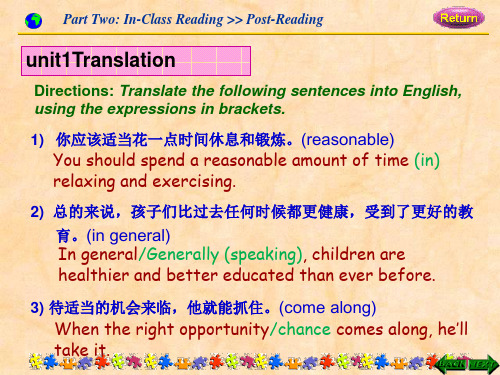
Part Two: In-Class Reading >> Post-Reading
4) 这些书的价格从10美元到20美元不等。(range/vary…
from… to) These books range/vary in price from $10 to $20.
5) 在我看来你没有什么选择。(It seems to me that…)
政府的批准).
9) Kelly loved her husband _in__s_p_i_te__o_f__t_h_e_f_a_c_t__t_h_a_t_h_e__d_r_a_n_k__t_o_o_m__u_c_h_ (虽然他喝酒太多).
10) Experts seem unable to _a_g_r_e_e__w_h_e_t_h_e_r__t_h_e_d_r_u_g__is__s_a_f_e__o_r_n_o_t__ (就这
Part Two: In-Class Reading >> Post-Reading
6) 他说他下午会呆在办公室里,以便万一你要见他。(in case)
He says he’ll stay in the office this afternoon in case you want to see him. 7) 科学家已确定了造成畸形发育的基因。(identify, abnormal) Scientists have identified the gene(s) that cause (s) abnormal growth.
Part Two: In-Class Reading >> Post-Reading
3) Ann p_r_o_m__is_e_d_/_a_s_s_u_r_e_d_f_a_it(信hf誓ul旦ly旦地保证) that she would never tell.
新编大学英语3课后翻译

新编大学英语3课后翻译Unit 1 PersonalityTranslation (P17)1) You should spend a reasonable amount of time relaxing and exercising. 你应该适当花一点时间休息和锻炼2) In general children are healthier and better educated than ever before.总的来说,孩子们比过去任何时候都更健康,受到了更好的教育.3) When the right opportunity comes along, he’ll take it.待适当的机会来临,他就能抓住.4) Every day he sets aside some time to be with his family and enjoy life. 每天他都留出点时间跟家里人在一起,享受生活.5) I remember those dark streets and walking hand in hand with my father. 我记得那些黑暗的街道以及同父亲手拉手走路的情景.6) He finally failed to live up to his parents’ expectations.他最终辜负了父母也的期望.7) In contrast, our use of oil has increased enormously.相比之下,我们的用油量大幅度上升了.8) He succeeded in his efforts to overcome his fatal weakness.经过压力,他成功地克服了自己致命弱点。
Unit 3 Social ProblemsTranslation (P113)1) Because of an emergency, the doctor will not be available for several hours.由于紧急情况,这位医生几小时内都没有空。
新编大学英语3课后习题答案
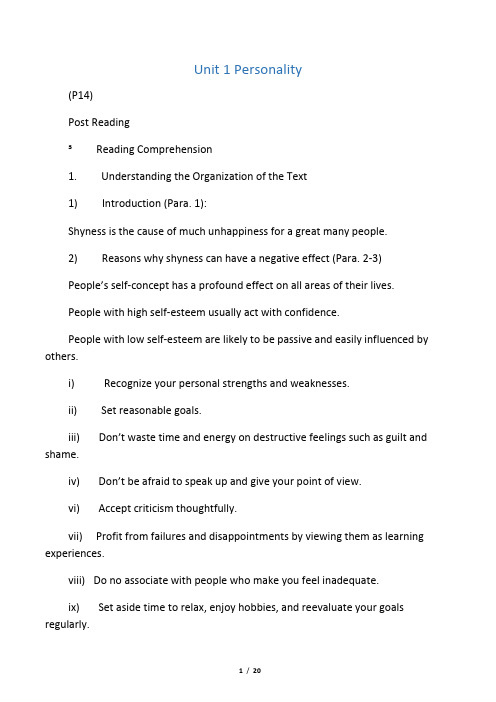
Unit 1 Personality(P14)Post Reading³Reading Comprehension1. Understanding the Organization of the Text1) Introduction (Para. 1):Shyness is the cause of much unhappiness for a great many people.2) Reasons why shyness can have a negative effect (Para. 2-3)People’s self-concept has a profound effect on all areas of their lives.People with high self-esteem usually act with confidence.People with low self-esteem are likely to be passive and easily influenced by others.i) Recognize your personal strengths and weaknesses.ii) Set reasonable goals.iii) Don’t waste time and energy on destructive feelings such as guilt and shame.iv) Don’t be afraid to speak up and give your point of view.vi) Accept criticism thoughtfully.vii) Profit from failures and disappointments by viewing them as learning experiences.viii) Do no associate with people who make you feel inadequate.ix) Set aside time to relax, enjoy hobbies, and reevaluate your goals regularly.x) Practice being in social situations.4) Conclusion (Para. 16)2. Understanding Specific Information1) F 2) T 3) T 4) T 5) F 6) T 7) F 8) F 9) T3. (略)Vocabulary Practice1.”Self-” is a prefix which means ‘of, to or by oneself or itself.’Words with the prefix “self-” that appear in the text: self-conscious, self-concept, self-assurance, self-worth, self-confidence, self-esteem, self-destructive, self-awareness, self-acceptance, self-rejection, self-confident.1. self-conscious (worried and embarrassed about what you look like or what other people think of you)2. self-confidence (belief in one’s own ability, power, judgment, etc.; confidence in oneself)3. self-esteem (the feeling that you are someone who deserves to be liked, respected, or admired)4. self-destructive (with thoughts or actions that are counter to one’s own best interests)5. self-worth (the value you give to your life and achievements)6. self-concept (one’s conception or general idea of one’s own basic character and nature)7. Self-awareness (realistic knowledge and judgment about oneself)8. self-assurance / self-confidence (the belief that you are able to deal with people and problems easily)2. 1) B 2) I 3) L 4) A 5) H 6) D 7) E8) N 9) J 10) M 11) C 12) F 13) G 14) K11) detrimental12) isolated 13) self-esteem 14) accented4. 1) reflected 2) concerned / worried 3) profound effect / influence4) viewed / regarded 5) sensitive 6) respond / reactTranslation1. You should spend a reasonable amount of time relaxing and exercising.2. In general children are healthier and better educated than ever before.4. Every day he sets aside some time to be with his family and enjoy life.5. I remember those dark streets and walking hand in hand with my father.6. He finally failed to live up to his parents’ expectations.7. In contrast, our use of oil has increased enormously.Part Four Writing and Translation(P 46)2. Translation PracticeFrom Chinese into English1) It is believed that pessimism often leads to hopelessness, sickness and failure.2) Optimism, by contrast, can make you happy, healthy and successful.3) When you fail in something, profit from the failure as a learning experience.4) Think about your strengths and build up self-confidence in front of problems or difficulties.5) Don’t let negative thoughts hold you back.6) Everyone has experienced failures and disappointments, so don’t bl ame yourself too much.Unit 2 Myths and Legends(P60)Post Reading³Reading Comprehension1. Testing Your Memory1) Because they were invited to a feast in the sky.2) He saw the birds were busy preparing.3) He planned to go to the feast / sky with the birds.4) They didn’t agree because Tortoise was mischievous / cunning and ungrateful.5) With a sweet tongue, he convinced the birds that he was a changed man.6) He made two wings with all the feathers he got from each bird.7) All of you.8) Nuts, meat and fish soup, pounded yam, yam soup, palm wine, etc.9) For whom have you prepared this feast?10) Because he knew the answer would be “For all of you”, which was his new name. So he could enjoy all the food first.11) They were very angry.12) They took back the feathers they had lent him.13) He asked them to take a message to his wife.14) Parrot, because he wanted to take advantage of the chance to get revenge.15) He asked Parrot to tell his wife to bring out all the soft things in his house and cover the ground with them so that he would be able to land safely. But Parrot told his wife to bring out all the hard and sharp things instead.16) His shell was broken into hundreds of pieces.2. Finding the Best SummarySample:3. Acting out the Story(略)4. Taking SidesSample:1) I don't admire Tortoise's cleverness. He was unwise to cheat all the birds. After his mischief, how could he have face to live together with them any longer? He would have no friends at all. He was clever, but at the same time he was also stupid . When all the birds became so angry, how could he have trusted Parrot? He should have jumped into the sea to avoid being hurt.I sympathize with the birds. They took Tortoise out of kindness, but after flying such a long distance, they had to fly back home on an empty stomach. They were formally invited, but the food was eaten by Tortoise. I think the birds were very unlucky.2) I learned from the story that a) we should be honest, and shouldn't cheat others. If we cheat others, we will be punished in the end; b) we shouldn't be carried away by sweet words, like the birds; c) a leopard can't change its spots, nor can Tortoise. He was cunning, he could never change his personality and behave himself.Vocabulary Practice1. 1) A. invitation B. invited C. inviting2) A. prepare B. prepared C. preparationD. preparatory / preparation3) A. discoveries B. discoverers C. discovered4) A. approval B. approve C. approved D. approvingE. disapprove5) A. eloquent B. eloquence C. eloquently6) A. faithful B. unfaithful/faithless C. faith D. faithfully7) A. occasional B. occasionally C. occasion8) A. delivery B. delivering C. delivered9) A. troublesome B. troubled C. troubled D. troubling10) A. assurance B. assured C. assure2. 1) got / ran into trouble 2) no trouble 3) asking for trouble4) have … trouble5) trouble with 6) in serious/deep/big trouble7) get/getting … into trouble8) took the trouble3. 1) with a pattern of roses2) prepared a wonderful / good meal for us3) promised faithfully4) deliver this letter5) a selection of milk and plain chocolate6) keep out of mischief / behave themselves7) the sound of distant thunder8) received approval from the government9) in spite of the fact that he drank too much10) agree whether the drug is safe or notPart Four Writing and Translation(P 96)2. Translation PracticeFrom English into Chinese万物之初,天地还是一体,充满混沌。
新编大学英语第三册第二单元课文翻译

Unit2粗糙的乌龟壳妻子们和她们的孩子在远处的房子里讲民间故事的时候,她们的低声细语,虽然时不时地为歌声所打断,还是传到了丈夫奥康瓦的耳中。
爱克蔚菲和她的女儿,爱金玛,正坐在地板的垫子上。
现在,轮到爱克蔚菲讲故事了。
突然,窃窃私语的声音停止了,屋里所有人的目光都转向了他们最喜欢和最擅长讲故事的人。
“很久很久以前,”她开始讲到,“所有的鸟儿都被邀请去天上参加一个宴会。
他们都非常高兴,开始为这难得的日子做准备。
他们把自己涂成深红色,用颜料在身上画出漂亮的图案。
”“陆龟见到了这些准备活动。
不久,他就发现了这所有的一切其他方面的缺点,陆龟是还是一个行走江湖、见识极广的人;他了解不同民族的风俗,因此,他们都分别起了一个新的名字。
鸟儿们都有了新的名字后,陆龟也起了一个;他被称作‘你们大家’。
”“最后,他们到达了目的地;天上的主人也为他们的光临倍感荣幸。
陆龟一身盛装地站着,并对他们的邀请表达了谢意。
他的言谈举止如此得体,众鸟儿都为把他带来了而感到由衷的高兴,并点头以示他所言不谬。
他们的主人也就顺理成章地把他当作众鸟之主,尤其是,他看起来是那样的与众不同。
”“在各种精挑细捡的果品呈上来又被吃掉之后,天上的招待就把最美味的饭菜放在了他们的客人面前,而这些都是陆龟曾经见过或者梦寐以求的。
刚从火上煮过的、热气腾腾的、布满了鱼和肉的汤也被原封不动地端了上来。
陆龟开始用力地去嗅。
随着摆上来的还有捣碎的山药和伴着棕榈油和鲜鱼肉的山药汤,成壶的棕榈酒。
一切准备就绪之后,其中的一位招待走上前去,并逐个品尝了一番。
接着他就邀请众鸟儿用餐。
但是,此时的陆龟却一跃而起,问道:‘这盛宴是为谁准备的?’”“于是,陆龟就转向众鸟儿,说道:‘你们都记得,我的名字是‘你们大家’。
而这里的风俗就是先招呼发言人,然后再招呼其他人等。
等我。
新编大学英语第三册课后翻译答案
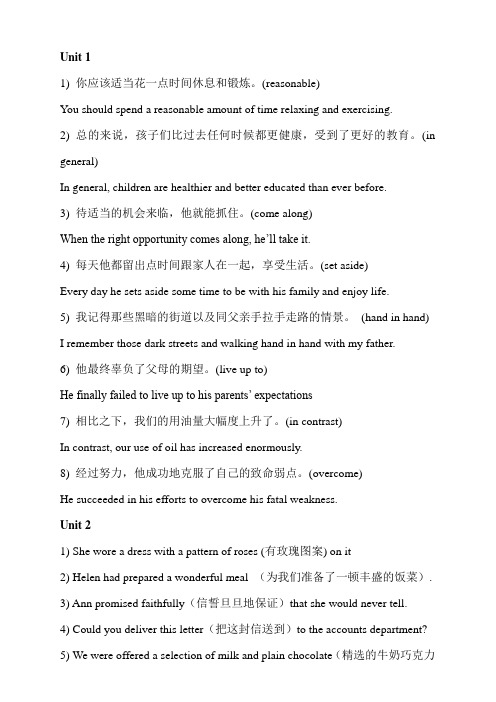
Unit 11) 你应该适当花一点时间休息和锻炼。
(reasonable)You should spend a reasonable amount of time relaxing and exercising.2) 总的来说,孩子们比过去任何时候都更健康,受到了更好的教育。
(in general)In general, children are healthier and better educated than ever before.3) 待适当的机会来临,他就能抓住。
(come along)When the right opportunity comes along, he’ll take it.4) 每天他都留出点时间跟家人在一起,享受生活。
(set aside)Every day he sets aside some time to be with his family and enjoy life.5) 我记得那些黑暗的街道以及同父亲手拉手走路的情景。
(hand in hand)I remember those dark streets and walking hand in hand with my father.6) 他最终辜负了父母的期望。
(live up to)He finally failed to live up to his parents’ expectations7) 相比之下,我们的用油量大幅度上升了。
(in contrast)In contrast, our use of oil has increased enormously.8) 经过努力,他成功地克服了自己的致命弱点。
(overcome)He succeeded in his efforts to overcome his fatal weakness.Unit 21) She wore a dress with a pattern of roses (有玫瑰图案) on it2) Helen had prepared a wonderful meal (为我们准备了一顿丰盛的饭菜).3) Ann promised faithfully(信誓旦旦地保证)that she would never tell.4) Could you deliver this letter(把这封信送到)to the accounts department?5) We were offered a selection of milk and plain chocolate(精选的牛奶巧克力和纯巧克力).6) Tell the children to behave themselves / keep out of mischief(别胡闹).7) We could hear the sound of distant thunder (远处打雷的声音).8) The project has now received approval from government (得到政府的批准).9) Kelly loved her husband in spite of the fact that he drank too much (虽然他喝酒太多).10) Experts seem unable to agree whether the drug is safe or not (就这个药是否安全取得一致意见).Unit 31) 由于紧急情况,这位医生几小时内都没有空。
新编大学英语3课后翻译题答案
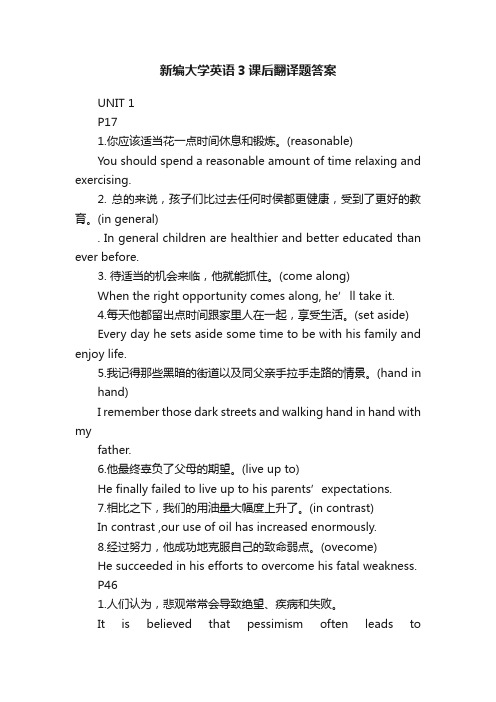
新编大学英语3课后翻译题答案UNIT 1P171.你应该适当花一点时间休息和锻炼。
(reasonable)You should spend a reasonable amount of time relaxing and exercising.2. 总的来说,孩子们比过去任何时侯都更健康,受到了更好的教育。
(in general). In general children are healthier and better educated than ever before.3. 待适当的机会来临,他就能抓住。
(come along)When the right opportunity comes along, he’ll take it.4.每天他都留出点时间跟家里人在一起,享受生活。
(set aside)Every day he sets aside some time to be with his family and enjoy life.5.我记得那些黑暗的街道以及同父亲手拉手走路的情景。
(hand inhand)I remember those dark streets and walking hand in hand with myfather.6.他最终辜负了父母的期望。
(live up to)He finally failed to live up to his parents’expectations.7.相比之下,我们的用油量大幅度上升了。
(in contrast)In contrast ,our use of oil has increased enormously.8.经过努力,他成功地克服自己的致命弱点。
(ovecome)He succeeded in his efforts to overcome his fatal weakness.P461.人们认为,悲观常常会导致绝望、疾病和失败。
新编大学英语综合教程3(第三版)课后翻译答案 (2)

1.羞怯可以让人从感觉轻微的不适到高度焦虑,这会对我们做任何事都有影响。
Shyness can vary from feeling mild discomfort to high level of anxiety that impact us in almost everything we do.2.尽管固执,但他清楚自己应该避免引起怀疑。
Despite his stubbornness, he knew that he should avoid arousing any suspicions.3.无论你说什么都会被理解成批评。
It will be interpreted as criticism no matter what you say.4.让我们不要为该被忽略和忘记的小事翻烦心。
Let’s not allow ourselves to be upset by trifles which we should ignore and forget.5.花太多的时间老是想着过去会阻碍你享受生活。
Too much time spent dwelling on the past can get in the way of enjoying life as it happens.6.相信自己能够完成目标并解决问题的人更有可能在学校里表现得好。
People who believe they can accomplish goals and solve problems are more likely to do well in school.1.她穿了一条有玫瑰团的裙子。
She wore a dress with a pattern of roses on it.2.Helen为我们准备了一顿丰盛的晚饭。
Helen had prepared a wonderful meal for us.3.Ann信誓旦旦的保证她不会说出去。
新编大学英语第三册课后答案(完整版)

Unit 1. PersonalityPart One- Preparation1. Mr. And Miss So and So1) Gentle 2) Dedicated 3) Considerate 4) Adventurous 5) Calm 6)Aggressive7) Critical 8) Energetic 9) Selfish 10) Ambitious 11) Self-confident 12) Easygoing13) Truthful 14) Outgoing 15) Frank 16) Sensitive 17) Bossy 18)Patient19) Talkative 20) Persuasive 21) Sympathetic 22) Emotional2. Personality and JobSalesperson- shrewed, hard-working, boastful, acute, trickyTeacher- patient, tolerant, talkative, unselfish, loving, humorous, bossyDoctor- patient, calm, independent, careful, sympatheticPolice officer- brave, alert, independent, strong, calmAccountant- careful, honest, cautious, patientLawyer- persuasive, expressive, eloquent, serious, knowledgeable, talkativeTourist guide- enthusiastic, talkative, expressive, energetic, considerate, good-temperedHost or hostess of a show- emotional, expressive, optimistic, quick-minded, exaggerated, humorousReporter- cautious, extroverted, open-minded, adventurousSecretrary- easygoing, tolerant, sensitive, frank, thorough, efficientSpokeperson- intelligent, talkative, diplomatic, cautious, matter-of-factPart Two – Post-readingReading ComprehensionUnderstanding the Organization of the Text1) Introduction: (para1)Shyness is the cause of much unhappiness for a great many people2) Reasons why shyness can have a negative effect: (para2-3)People’ s self-concept has a profound effect on all areas of their lives.People with high self-esteem unsually act with confidence.People with low self-esteem are likey to be passive and easily influenced by others.3) Ways of overcoming shyness: (para 4-15)i) Recognize your personal strengths and weaknesses.ii) Set reasonable goals.iii) Don’t waste time and energy on destructive feelings such as guilt and shame.iv) Don’t be afraid to speak up and give your point of view.v) Do not make negative comments about yourself.vi) Accept criticism thoughfully.vii) Profit from failures and disappointments by viewing them as learning experiences.viii) Do not associate with people who make you feel inadequate.ix) Set aside time to relax, enjoy hobbies, and reevaluate your goals regularly.x) Practice being in social situations.4) Conclusion: (para16)The better we understand ourselves, the easier it becomes to live up to our full potential.2. Understanding Specific Information1) F 2) T 3) T 4) T 5) F 6)T 7)F 8)F 9)TVocabulary1.1) self-couscious (worried and embarrassed about what you look like or what other people think of you.)2) self-confidence (belief in one’s own ability, power, judgment, etc,; confidence in oneself)3) self-esteem (the feeling that you are someone who deserves to be liked, respected, or admired)4) self-destructive (with thoughts or actions that are counter to one’s own best interests)5) self-worth (the value you give to your life and achievements)6) self-concept (one’s conception or general idea of one’s own basic character and nature)7) self-awareness (realistic knowledge and judgment about oneself)8) self-assurance/self-confidence (the belief that you are able to deal with people and problems easily)2.1) B 2 ) I 3) L 4) A 5) H 6) D 7) E8) N 9) J 10) M 11) C 12) F 13) G 14) K3.1) profound 2)jealousy 3) numerous 4)overweight 5) overcome6) eventually 7) slim 8) compliments 9) diminish 10) reassurance11) detrimental 12) isolated 13) self-esteem 14) accented4.1) reflected 2) concerned/worried 3) profound effect/influence 4) viewed/regarded5) sensitive 6) respond/ react 7) eliminated 8) overcome my fear9) concentrate on 10) made no commentTranslation1) You should spend a reasonable amount of time relaxing and exercising.(spend time on sth/ in doing sth)2) In general children are healthier and better educated than ever before. (than ever before)3) When the right opportunity comes along, he’ll take it.4) Every day he sets aside some time to be with his family and enjoy life.5) I remember those dark streets and walking hand in hand with my father.6) He finally failed to live up to his parents’ expectations.7) In contrast, our use of oil has increased enormously.8) He succeeded in his efforts to overcome his fatal weakness.Part Three – Further Development1. Enriching Your Word Power1) B 2)B 3)A 4) B 5) D 6) C 7)B 8)C 9)A 10)A 11) C 12) BPart Four- Writing and Translation2.1) It is believed that pessimism often leads to hopelessness, sickness and failure.2) Optimism, by contrast, can make you happy, healthy and successful.3) When you fail in something, profit from the failure as a learning experience.4) Think about your strengths and build up self-confidence in front of problems or difficulties.5) Don’t let negative thoughts hold you back.6)Everyone has experienced failures and disappointments, so don’t blame yourself too much.Unit 2 Myths and LegendsPart One – Preparation4. Matching Pictures1. Aphrodite2. Ares3. Hephaestus4. Artemis5. Demeter6. Dionysus7. Poseidon 8. Athena 9. Apollo 10. hermes 11. Hera 12. ZeusPart Two – Post-reading1. Testing Your Memory1) Because they were invited to a feast in the sky.2) He saw the birds were busy preparing.3) He planned to go to the feast/ sky with the birds.4) They didn’t agree because Tortoise was mischievous/ cunning and ungrateful.5) With a sweet tongue, he convinced the birds that he was a changed man.6) He made two wings with all the features he got from each bird.7) All of You.8) Nuts, meat and fish soup, punded yam, yam soup, palm wine, etc.9) For whom have you prepared this feast?10) Because he knew the answer would be “For all of you”, which was his new name. So he could enjoy all the food first.11) They were very angry.12) They took back the feathers they had lent him.13) He asked him to take a message to his wife.14) Parrot, because he wanted to take advantage of the chance to get revenge.15) He asked Parrot to tell his wife to bring out all the soft things in his house and cover the ground with them so that he would be able to land safely. But Parrot told his wife to bring out all the hard and sharp things instead.16) His shell was broken into hundreds of pieces.Vocabulary1.1) A. invitation B. invited C. inviting2) A. prepare B. prepared C. preparation D. preparatory / preparation3) A. discoveries B. discoverers C. discovered4) A. approval B. approve C. approved D. approvign E. disapprove5) A. eloquent B. eloquence C. eloquently6) A. faithful B. unfaithful/ faithless C. faith D. faithfully7) A. occasional B. occasionally C. occasion8) A. delivery B. delivering C. delivered9) A. troubesome B. troulbed C. troubled D. troubling10) A. assurance B. assured C. assure2.1) got/ran into trouble 2) no trouble 3) asking for trouble 4) have…trouble5) trouble with 6) in serious/ deep/ big trouble 7) get/getting …into trouble 8) took the trouble3.1) with a pattern of roses.2) prepared a wonderful / good meal for us3) promised faithfully4) deliver this letter5) a selection of milk and plain chocolate6) keep out of mischief / behave themselves7)the sound of distant thunder8) received approval from the government9) in spite of the fact that he drank too much10)agree whether the drug is safe or notPart Three – Further Development3 1. Enriching Your Word Power1) C 2) C 3) A 4) B 5)A 6) B 7) A 8) B 9) B 10) A 11) B 12) APart Four – Writing and Translation4 2. Translation Practice万物之初,天体还是一体,充满混沌。
新编大学英语第三册课文翻译课后习题答案after_class_reading翻译1.doc
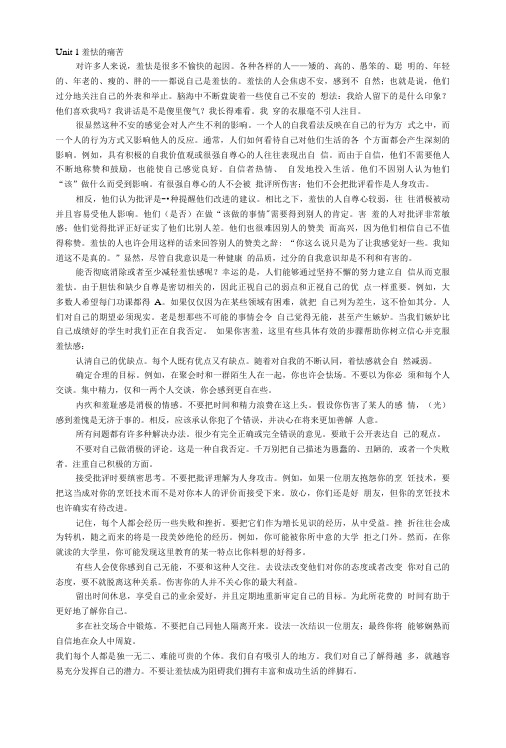
Unit 1羞怯的痛苦对许多人来说,羞怯是很多不愉快的起因。
各种各样的人——矮的、高的、愚笨的、聪明的、年轻的、年老的、瘦的、胖的——都说自己是羞怯的。
羞怯的人会焦虑不安,感到不自然;也就是说,他们过分地关注自己的外表和举止。
脑海中不断盘旋着一些使自己不安的想法:我给人留下的是什么印象?他们喜欢我吗?我讲话是不是傻里傻气?我长得难看。
我穿的衣服毫不引人注目。
很显然这种不安的感觉会对人产生不利的影响。
一个人的自我看法反映在自己的行为方式之中,而一个人的行为方式又影响他人的反应。
通常,人们如何看待自己对他们生活的各个方面都会产生深刻的影响。
例如,具有积极的自我价值观或很强自尊心的人往往表现出自信。
而由于自信,他们不需要他人不断地称赞和鼓励,也能使自己感觉良好。
自信者热情、自发地投入生活。
他们不因别人认为他们“该”做什么而受到影响。
有很强自尊心的人不会被批评所伤害;他们不会把批评看作是人身攻击。
相反,他们认为批评是-•种提醒他们改进的建议。
相比之下,羞怯的人自尊心较弱,往往消极被动并且容易受他人影响。
他们(是否)在做“该做的事情"需要得到别人的肯定。
害羞的人对批评非常敏感;他们觉得批评正好证实了他们比别人差。
他们也很难因别人的赞美而高兴,因为他们相信自己不值得称赞。
羞怯的人也许会用这样的话来回答别人的赞美之辞: “你这么说只是为了让我感觉好一些。
我知道这不是真的。
”显然,尽管自我意识是一种健康的品质,过分的自我意识却是不利和有害的。
能否彻底消除或者至少减轻羞怯感呢?幸运的是,人们能够通过坚持不懈的努力建立自信从而克服羞怯。
由于胆怯和缺少自尊是密切相关的,因此正视自己的弱点和正视自己的优点一样重要。
例如,大多数人希望每门功课都得A。
如果仅仅因为在某些领域有困难,就把自己列为差生,这不恰如其分。
人们对自己的期望必须现实。
老是想那些不可能的事情会令自己觉得无能,甚至产生嫉妒。
当我们嫉妒比自己成绩好的学生时我们正在自我否定。
新编大学英语第二版第3册课后翻译答案
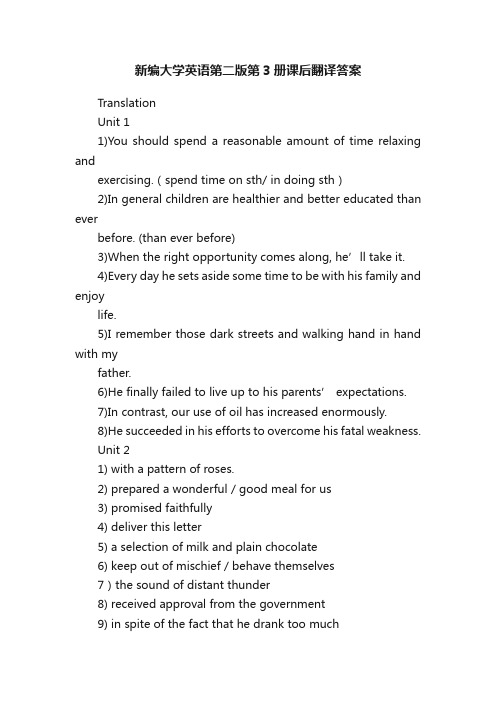
新编大学英语第二版第3册课后翻译答案TranslationUnit 11)You should spend a reasonable amount of time relaxing andexercising.(spend time on sth/ in doing sth)2)In general children are healthier and better educated than everbefore. (than ever before)3)When the right opportunity comes along, he’ll take it.4)Every day he sets aside some time to be with his family and enjoylife.5)I remember those dark streets and walking hand in hand with myfather.6)He finally failed to live up to his parents’ expectations.7)In contrast, our use of oil has increased enormously.8)He succeeded in his efforts to overcome his fatal weakness.Unit 21) with a pattern of roses.2) prepared a wonderful / good meal for us3) promised faithfully4) deliver this letter5) a selection of milk and plain chocolate6) keep out of mischief / behave themselves7)the sound of distant thunder8) received approval from the government9) in spite of the fact that he drank too much10)agree whether the drug is safe or notUnit 31)Because of an emergency, the doctor will not be available forseveral hours.2)How will taxes affect people with low incomes?3)My mother always told me that in the long run I would beglad I didn’t give up p racticing the piano.4)These book range in price form $10 to $20.5)It seems to me that you don’t have much choice.6)Given their inexperience, they have done quite a good job.7)For such a big house the price is fairly cheap/low, but you’vegot to take into consideration the money you will spend on repairs.8)Can we begin with discussing questions/problems arising fromthe last meeting?Unit 41)He underwent a major heart surgery several years ago.2)We estimated that it would take a week to finish the work.3)I used to enjoy photography, but now I have no time to pursueany hobbies.4)You may love someone but not necessarily have to marry him.5)Terrorists resort to violence to achieve their political aims.6)He says he’ll stay in the office this afternoon in case you want tosee him.7)Scientists have identified the gene that causes abnormal growth.8)These examples demonstrate how badly some students write theirresumes.Unit 51)Seeing all the people walking to and fro outside the office, Ibecame more worried.2)In time he will see who his true friend is.3)That scientist’s experiment gave birth to a new drug.4)He had been shut in by illness during much of the winter.5)They would practice spoken English at the first opportunity.6)Everything she valued might be swept away overnight.7)Towards the close of the term, all the students are busy preparingfor the finals.8)It is a very cold winter and we long for it to be over.Unit 61)She always behaves badly when her aunt comes to visit.2)If it hadn’t been for your help, we wouldn’t have been able tofinish the task in time.3)I warned him off going to the east coast because it was full oftourists.4)The fact that something is cheap doesn’t necessarily mean it’sof low quality.5)Without anyone to turn to for help, making an appropriatechoice can be difficult.6)His sadness at the death of his wife found expression in his music.7)Only if Peter goes to the evening party will she go.8)I can only compare the experience to a nightmare.Unit 71)I didn’t realize putting on/ staging a play involved somuch work.2)The most important thing is not what you say but whatyou do.3)This is the best result that can be expected in suchcircumstances.4)It isn’t the first time that you’ve found yourself in such asituation.5)This difficulty challenges my mind to find an answer.6)The new threat on the horizon is unemployment.7)We have alternative ways of expressing the same idea.8)He slipped into the old habit of drinking.Unit 91)I took advantage of the fine weather today to play tennis.2)You may even swim in the lake if you feel inclined to.3)The loud music brought on another one of his headaches.4)A careless is apt to make mistakes.5)The experiment resulted in the discovery of a cure for cancer.6)Comparatively speaking, we are more concerned with workefficiency and product development.7)Doctors said that surgery could induce heart attack.8)I qualified/ was qualified as a doctor at London University30years ago.Unit 101)When he returned to his office, he was confronted withan enormous pile of work.2)The captain of this football team scored two wonderfulgoals early on in the game.3)Provided they are fit, I don’t know why they won’tgo on playing for another three or four years.4)In emergencies he can still make sound judgments.5)While I admit that there are problems, I don’t agreethat they cannot be solved.6)He went on listening to her, at times impatient and attimes fascinated.7)We must find a way to resolve these problems before itis too late.8)Parents cannot always have the school of their choicefor their children.。
新编大学英语第三册课后答案课文翻译

Unit 1 PersonalityVocabulary (P16)1. 1) self-conscious 2) self-confidence 3) self-esteem 4) self-destructive 5) self-worth6) self-concept 7) Self-awareness 8) self-assurance/self-confidence2. 1)B 2)I 3)L 4)A 5)H 6)D 7)E 8)N 9)J 10)M 11)C 12)F 13)G 14)K3. 1) profound 2) jealousy 3) numerous 4) overweight 5) overcome 6) eventually 7) slim8) compliments 9) diminish 10) reassurance 11) detrimental 12) isolated 13) self-esteem 14) accented 4. 1) reflected 2) concerned/worried 3) profound effect/influence 4) viewed/regarded 5)sensitive6) respond/react 7)eliminated 8)overcome my fear 9) concentrate on 10) made no comment Translation (P17)1) You should spend a reasonable amount of time relaxing and exercising.2) In general children are healthier and better educated than ever before.3) When the right opportunity comes along, he’ll take it.4) Every day he sets aside some time to be with his family and enjoy life.5) I remember those dark streets and walking hand in hand with my father.6) He finally failed to live up to his parents’ expectations.7) In contrast, our use of oil has increased enormously.8) He succeeded in his efforts to overcome his fatal weakness.Part Four Writing and Translation (P46)2. Translation Practice1) It is believed that pessimism often leads to hopelessness, sickness and failure.2) Optimism, by contrast, can make you happy, healthy and successful.3) When you fail in something, profit from the failure as a learning experience.4) Think about your strengths and build up self-confidence in front of problems or difficulties.5) Don’t let negative thoughts hold you back.6) Everyone has experienced failures and disappointments, so don’t blame yourself too much.Unit 2 Myths and LegendsVocabulary (P62)1. 1) A. invitation B. invited C. inviting 2) A. prepare B. prepared C. preparation D. preparatory/preparation3) A. discoveries B. discoverers C. discovered4) A. approval B. approve C. approved D. approving E. disapprove5) A. eloquent B. eloquence C. eloquently6) A. faithful B. unfaithful/faithless C. faith d. faithfully7) A. occasional B. occasionally C. occasion8) A. delivery B. delivering C. delivered9) A. troublesome B. troubled C. troubled D. troubling10) A. assurance B. assured C. assure2. 1) got/ran into trouble 2) no trouble 3) asking for trouble 4) have … trouble 5) trouble with 6) in serious/deep/big trouble 7) get/getting … into trouble 8) took the trouble3. 1) with a pattern of roses 2) prepared a wonderful/goof meal for us3) promised faithfully 4) deliver this letter5) a selection of milk and plain chocolate 6) keep out of mischief/behave themselves7) the sound of distant thunder 8) received approval from the government9) in spite of the fact that he drank too much 10) agree whether the drug is safe or notPart Three Further Development5. Complete the following Ancient Chinese story by translating the Chinese into English(P93)1) the true reason why there was no such animal in Guizhou2) they were of no use at all in this place3) when he saw the donkey all of a sudden, he thought it was a monster4) he hid himself in the trees while looking at the donkey5) what kind of animal is this and why does it look different from other animals that I’ve seen?6) But one day the donkey stretched its thin neck and cried7) the tiger discovered that the donkey didn’t have any other skills besides crying8) But he dared not rush to it and eat it just as he did to other animals9) This did irritate the donkey (made the donkey angry), who raised its hind leg and kicked the tiger10) This time he rushed to it without hesitation and bit its rhroatPart Four Writing and Translation2. Translation Practice(P96)万物之初,天地还是一体,充满混沌。
新编大学英语3课后答案 (2)

新编大学英语3课后答案第一课知识点总结本课主要讲述了英语词汇的积累和语法的应用。
以下是本课后的答案和详细解析:词汇题1.vocabulary2.experience3.recommend4.participate5.opportunity语法题1.答案:C 解析:该题考查一个句子的完整性和结构。
选项A和B是不完整的句子,选项D中的that与后面的句子没有关联。
只有选项C是完整的且结构正确的句子。
2.答案:B 解析:该题考查不定代词的用法。
选项A、C和D中的不定代词没有替代前面的动词,结构上不连贯。
只有选项B中的something正确地引用了前面的动词want。
3.答案:C 解析:该题考查特殊疑问句的构成。
选项A和B的疑问词位置不正确,选项D中的how太宽泛。
只有选项C的构成是正确的特殊疑问句。
4.答案:D 解析:该题考查动词的时态和语态。
选项A、B和C的时态和语态形式不正确,只有选项D的被动语态过去完成时正确表示了动作的先后顺序。
5.答案:A 解析:该题考查介词的用法。
选项B和C的介词后面没有宾语,选项D的介词与后面的短语没有关联。
只有选项A的介词of和前面的名词work形成了正确的介词短语。
第二课知识点总结本课主要讲述了英语听力和口语的训练。
以下是本课后的答案和详细解析:听力题1.答案:B 解析:根据对话内容,选项B中的周末做日常事务是正确的答案。
选项A和C与对话内容不符。
选项D中的打电话没有提到。
2.答案:D 解析:根据对话内容,选项D中的长时间不见是正确的答案。
选项A和B中的原因没有提到。
选项C中的电影是对话中的假设,并不是实际情况。
3.答案:C 解析:根据对话内容,选项C中的改变了计划是正确的答案。
选项A和B与对话内容不符。
选项D 中的喜欢做家务没有提到。
口语题1.答案:I’m sorry to hear that. 解析:这是表达同情和关心的口语表达方式。
2.答案:Could you repeat that, please? 解析:这是要求对方重复说话内容的口语表达方式。
新编大学英语3第三版课后答案
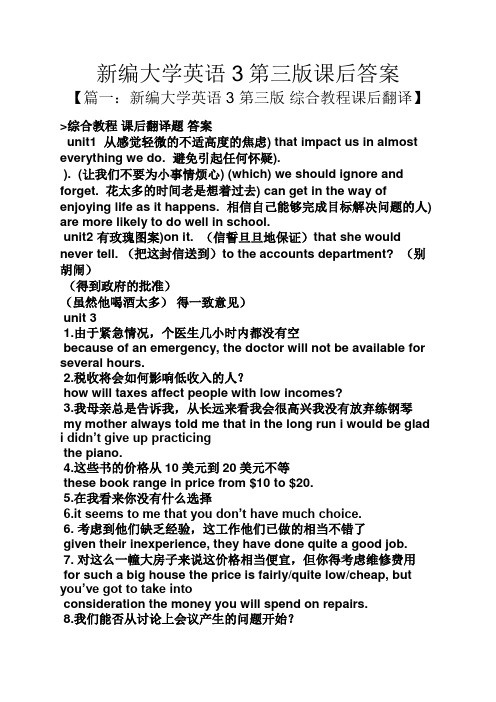
新编大学英语3第三版课后答案【篇一:新编大学英语3 第三版综合教程课后翻译】>综合教程课后翻译题答案unit1 从感觉轻微的不适高度的焦虑) that impact us in almost everything we do. 避免引起任何怀疑).). (让我们不要为小事情烦心) (which) we should ignore and forget. 花太多的时间老是想着过去) can get in the way of enjoying life as it happens. 相信自己能够完成目标解决问题的人) are more likely to do well in school.unit2 有玫瑰图案)on it. (信誓旦旦地保证)that she would never tell. (把这封信送到)to the accounts department? (别胡闹)(得到政府的批准)(虽然他喝酒太多)得一致意见)unit 31.由于紧急情况,个医生几小时内都没有空because of an emergency, the doctor will not be available for several hours.2.税收将会如何影响低收入的人?how will taxes affect people with low incomes?3.我母亲总是告诉我,从长远来看我会很高兴我没有放弃练钢琴my mother always told me that in the long run i would be glad i didn’t give up practicingthe piano.4.这些书的价格从10美元到20美元不等these book range in price from $10 to $20.5.在我看来你没有什么选择6.it seems to me that you don’t have much choice.6. 考虑到他们缺乏经验,这工作他们已做的相当不错了given their inexperience, they have done quite a good job.7. 对这么一幢大房子来说这价格相当便宜,但你得考虑维修费用for such a big house the price is fairly/quite low/cheap, but you’ve got to take intoconsideration the money you will spend on repairs.8.我们能否从讨论上会议产生的问题开始?can we begin with discussing questions arising from the last meeting?unit 4 but i now have no time to pursue anyhobbies. 没有一种可确信的方式来预测)who will develop asthma and who won’t. (大脑是否能生成新细胞)4. i don’t love acting, said angelina jolie.5.if you don’t define your goal ,you don’t know in which(你应该向哪个方向前进)(花些时间回顾和思考你走过的路)(不一定得和他结婚)(有些学生的简历写得多么差)unit 5 (看到所有人在办公室外面走来走去)i became more worried.(谁是他真正的朋友,在困难时可依靠)3.(那位科学家的实验使一种新药问世)a better cure for high blood pressure. 我一有机会就要让他们相信) that i was a policeman not a politician. (当你清除一个旧的社会时)you can’t overnight change the institutions of thought that have been built up over centuries. (在本世纪临近结束时) another two billion people will be born, the great majority in developing countries. (如果你渴望自己,自己的家,自己的国家有更好的未来)stay and continue your studies here.uint 61.如果要我选择一个方案的话,我将毫不犹豫地支持后者if i had to select one plan, i would not hesitate to support the latter.2他看上去似乎是无罪的,但证据表明并非如此。
新编大学英语3课文翻译及课后习题答案
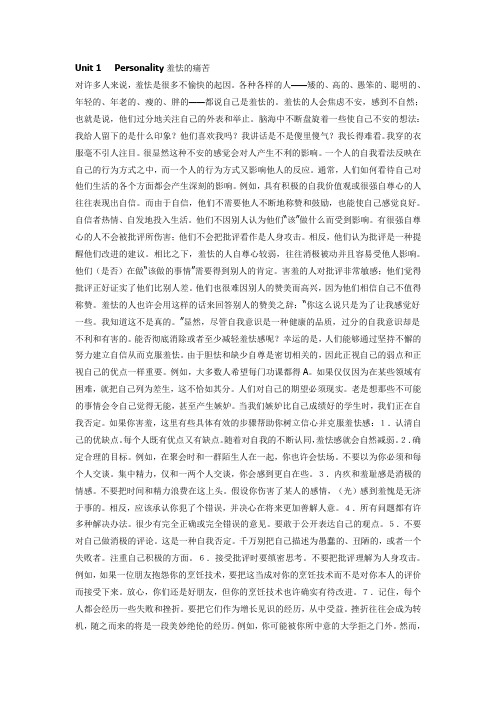
Unit 1 Personality羞怯的痛苦对许多人来说,羞怯是很多不愉快的起因。
各种各样的人——矮的、高的、愚笨的、聪明的、年轻的、年老的、瘦的、胖的——都说自己是羞怯的。
羞怯的人会焦虑不安,感到不自然;也就是说,他们过分地关注自己的外表和举止。
脑海中不断盘旋着一些使自己不安的想法:我给人留下的是什么印象?他们喜欢我吗?我讲话是不是傻里傻气?我长得难看。
我穿的衣服毫不引人注目。
很显然这种不安的感觉会对人产生不利的影响。
一个人的自我看法反映在自己的行为方式之中,而一个人的行为方式又影响他人的反应。
通常,人们如何看待自己对他们生活的各个方面都会产生深刻的影响。
例如,具有积极的自我价值观或很强自尊心的人往往表现出自信。
而由于自信,他们不需要他人不断地称赞和鼓励,也能使自己感觉良好。
自信者热情、自发地投入生活。
他们不因别人认为他们“该”做什么而受到影响。
有很强自尊心的人不会被批评所伤害;他们不会把批评看作是人身攻击。
相反,他们认为批评是一种提醒他们改进的建议。
相比之下,羞怯的人自尊心较弱,往往消极被动并且容易受他人影响。
他们(是否)在做“该做的事情”需要得到别人的肯定。
害羞的人对批评非常敏感;他们觉得批评正好证实了他们比别人差。
他们也很难因别人的赞美而高兴,因为他们相信自己不值得称赞。
羞怯的人也许会用这样的话来回答别人的赞美之辞:“你这么说只是为了让我感觉好一些。
我知道这不是真的。
”显然,尽管自我意识是一种健康的品质,过分的自我意识却是不利和有害的。
能否彻底消除或者至少减轻羞怯感呢?幸运的是,人们能够通过坚持不懈的努力建立自信从而克服羞怯。
由于胆怯和缺少自尊是密切相关的,因此正视自己的弱点和正视自己的优点一样重要。
例如,大多数人希望每门功课都得A。
如果仅仅因为在某些领域有困难,就把自己列为差生,这不恰如其分。
人们对自己的期望必须现实。
老是想那些不可能的事情会令自己觉得无能,甚至产生嫉妒。
当我们嫉妒比自己成绩好的学生时,我们正在自我否定。
新编大学英语第三册课后翻译题答案1-7(中译英)(全)

(P17)1. 你应该适当花一点时间休息和锻炼(reasonable)You should spend a reasonable amount of time relaxing and exercising.2. 总的来说,孩子们比过去任何时候都更健康,收到了更好的教育。
(in general)In general children are healthier and better educated than ever before.3. 待适当的机会来临,他就能抓住。
(come along)When the right opportunity comes along, he’ll take it.4. 每天他都留出点时间跟家里人在一起,享受生活。
(set aside)Every day he sets aside some time to be with his family and enjoy life.5. 我记得那些黑暗的街道以及同父亲手拉手走路的情景。
(hand in hand)I remember those dark streets and walking hand in hand with my father.6. 他最终辜负了父母的期望。
(live up to)He finally failed to live up to his parents’ expectations.7. 相比之下,我们的用油量大幅度上升了。
(in contrast)In contrast, our use of oil has increased enormously.8. 经过努力,他成功地克服了自己的致命弱点。
(overcome)He succeeded in his efforts to overcome his fatal weakness.(P46)1) 人们认为,悲观常常会导致绝望、疾病和失败。
新编大学英语(第三版)第二册(2)课文及课后翻译
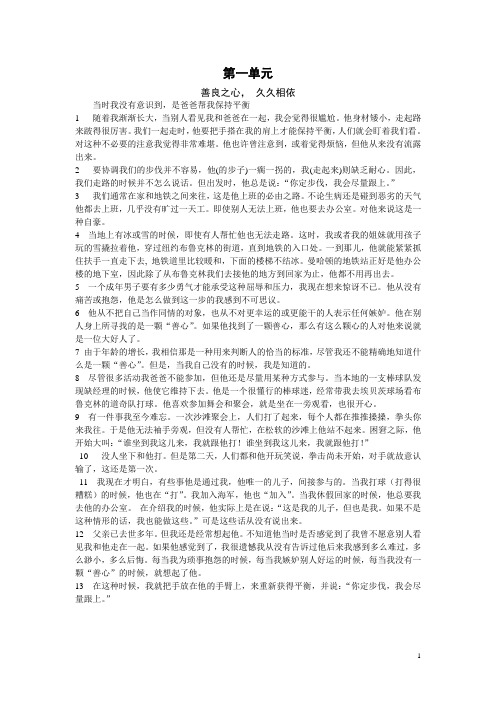
第一单元善良之心,久久相依当时我没有意识到,是爸爸帮我保持平衡1 随着我渐渐长大,当别人看见我和爸爸在一起,我会觉得很尴尬。
他身材矮小,走起路来跛得很厉害。
我们一起走时,他要把手搭在我的肩上才能保持平衡,人们就会盯着我们看。
对这种不必要的注意我觉得非常难堪。
他也许曾注意到,或着觉得烦恼,但他从来没有流露出来。
2 要协调我们的步伐并不容易,他(的步子)一瘸一拐的,我(走起来)则缺乏耐心。
因此,我们走路的时候并不怎么说话。
但出发时,他总是说:“你定步伐,我会尽量跟上。
”3 我们通常在家和地铁之间来往,这是他上班的必由之路。
不论生病还是碰到恶劣的天气他都去上班,几乎没有旷过一天工。
即使别人无法上班,他也要去办公室。
对他来说这是一种自豪。
4 当地上有冰或雪的时候,即使有人帮忙他也无法走路。
这时,我或者我的姐妹就用孩子玩的雪撬拉着他,穿过纽约布鲁克林的街道,直到地铁的入口处。
一到那儿,他就能紧紧抓住扶手一直走下去, 地铁道里比较暖和,下面的楼梯不结冰。
曼哈顿的地铁站正好是他办公楼的地下室,因此除了从布鲁克林我们去接他的地方到回家为止,他都不用再出去。
5 一个成年男子要有多少勇气才能承受这种屈辱和压力,我现在想来惊讶不已。
他从没有痛苦或抱怨,他是怎么做到这一步的我感到不可思议。
6 他从不把自己当作同情的对象,也从不对更幸运的或更能干的人表示任何嫉妒。
他在别人身上所寻找的是一颗“善心”。
如果他找到了一颗善心,那么有这么颗心的人对他来说就是一位大好人了。
7 由于年龄的增长,我相信那是一种用来判断人的恰当的标准,尽管我还不能精确地知道什么是一颗“善心”。
但是,当我自己没有的时候,我是知道的。
8 尽管很多活动我爸爸不能参加,但他还是尽量用某种方式参与。
当本地的一支棒球队发现缺经理的时候,他使它维持下去。
他是一个很懂行的棒球迷,经常带我去埃贝茨球场看布鲁克林的道奇队打球。
他喜欢参加舞会和聚会,就是坐在一旁观看,也很开心。
新编大学英语课后答案第三册浙江大学版共13页word资料

Unit 1Part onepreparation1.1)Gentle 2)Dedicated 3)Considerate 4)Adventurous 5)Calm 6)Aggressive 7)Critical 8)Energetic 9)Selfish 10)Ambition 11)Self-confident 12)Easygoing 13)Truthful 14)Outgoing 15)Frank 16)Sensitive 17)Bossy 18)Patient19)Talkative 20)Persuasive 21)Sympathetic 22)Emotional2.Jobs Personalitysalesperson undependable、shrewd、tricky、boastfulteacher knowledge、talkative、patient、energetic、unselfish、tolerantdoctor calm、skillful、sympathetic、careful、unselfishpolice office brave、calm、alert、carefulaccount cautious、careful、efficient、truthfullawyer knowledge、persuasive、talkative、expressive、intelligent tourist guide energetic、good-tempered、talkativehost or hostess of a show quick-minded、humorous、knowledge、expressive、emotional reporter adventurous、brave、curious、efficientsecretary considerate、careful、efficient、easygoingspokesperson diplomatic、intelligent、eloquentPart twopost-readingReading Comprehension1.1)much unhappiness2)a profound effectusually act with confidenceare likely to be passive and easily influenced by others3)i)Recognize your personal strengths and weaknessesii)Set reasonable goalsiv)Don't be afraid to speak up and give your point of viewv)Do not make negative comments about yourselfvi)Accept criticism thoughtfullyviii)Do not associate with people who make you feel inadequateix)Set aside time to relax,enjoy hobbies,and reevaluate your goal regularx)Practice being in social situation2. 1)FTTTF 6)TFFTVocabulary1.1)self-conscious 2)self-confidence 3)self-esteem 4)self-destructive 5)self-worth6)self-concept 7)self-awareness 8)self-assurance/self-confidence2.1)B 2)I 3)L 4)A 5)H 6)D 7)E 8)N 9)J 10)M 11)C 12)F 13)G 14)K3.1)profound 2)jealousy 3)numerous 4)overweight 5)overcome 6)eventually7)slim 8)compliments 9)diminish 10)reassurance 11)detrimental 12)isolated 13)self-esteem 14)accented4.1)reflected 2)concerned/worried 3)profound effect/influence 4)viewed/regarded5)sensitive 6)respond/react 7)eliminated 8)over my fear 9)concentrate on 10)made no commentTranslation1)You should set aside a reasonable amount of time to rest and exercise.2)In general,children are mush healthier and better educated than ever before.3)He can grasp the chances that come along.4)Each day,he sets aside time to be with his family and enjoy life.5)I still remembered those dark streets and the scene I walked hand in hand with my father.6)He eventually didn't live up to his parents' expectations.7)In contrast,our use of oil has enormously increased.8)Through efforts,he managed to overcome his fatal weakness.Part ThreeFURTHER Development1. 1)BBABC 6)CBCAA 11)CBUnit 2Part onepreparation4.matching pictures1)Aphrodite 2)Ares 3)Hephaestus 4)Artemis 5)Demeter 6)Dionysus 7)Poseidon 8)Athena 9)Apollo 10)Hermes 11)Hera 12)ZeusPart twopost-readingReading Comprehension1.1)Because they were invited to a feast in the sky.2)He saw the birds were busy preparing.3)He planned to go to the feast/sky with the birds.4)They don't agree because Tortoise was mischievous and ungrateful.5)With a sweet tongue, he convinced the birds that he was a change man.6)He made two wings with all the feathers he got from each bird.7)All of you.8)Nuts, meat and fish soup, pounded yam soup, palm wine, etc.9)For whom have you prepared this feast?10)Because he knew the answer would be "For all of you", which was his new name. So he could enjoy all the food.11)They were very angry.12)They took back the feathers they had lent him.13)He asked them to take a message to his wife.14)Parrot,because he wanted to take advantage of the change to get revenge.15)He asked Parrot to tell his wife to bring out all the soft things in his house and cover the ground with them so that he would be able to land safety. But Parrot told his wife to bring out allthe hard and sharp things instead.16)His shell was broken into hundreds of pieces.Vocabulary1. 1)A.invitation B.invited C.inviting 2)A.prepare B.prepared C.preparationD.preparatory/preparation 3)A.discoveries B.discoverers C.discovered4)A.approval B.approve C.approved D.approving E.disapprove 5)A.eloquentB.eloquenceC.eloquently 6)A.faithful B.unfaithful/faithless C.faithD.faithfully 7)A.occasional B.occasionally C.occasion 8)A.delivery B.delivering C.delivered 9)A.troublesome B.troubled C.troubled D.troubling 10)A.assurance B.assuredC.assure2. 1)got/ran into trouble 2)no trouble 3)asking for trouble 4)have...trouble 5)trouble with6)in serious/deep/big trouble 7)get/getting...into trouble 8)took the trouble3. 1)with a pattern of roses2)prepared a wonderful/good/large meal for us3)promised faithfully4)deliver the letter5)a selection of milk and plain chocolate6)keep out of mischief7)the sound of distant thunder8)been approved by the government9)despite the fact that he drank too much10)reach an agreement whether the drug is safe or notPart ThreeFURTHER Development1. 1)CCABA 6)BABBA 11)BA5.1)the true reason why there was no such animal in Guizhou2)they were useless in this place3)When he suddenly saw the donkey, he thought it was a monster4)He hid himself in the tree while looking at donkey5)What kind of animal is this and why does it look different from other animal that I've ever seen6)But one day the donkey stretched its thin neck and cried7)the tiger found that the donkey didn't have any other skills besides crying8)But he dared not rush to it and eat it just as he did to other animals9)This did make the donkey angry,so it raised its hind leg and kicked the tiger10)This time he rushed to it without hesitation and bit is throatUnit 3Part twopost-readingReading Comprehension1.1)financial 2)career 3)later 4)guilty 5)hurt 6)resentful 7)productive8)independence 9)responsibility 10)trusted 11)frightening 12)resentment13)abandoned 14)factors 15)quality2.1)TFTFT 6)FFFFFVocabulary1. 1)CHGAE 6)KIDLB 11)JF2. 1)constantly 2)impact 3)burden 4)Candidly 5)fulfillment 6)salaried7)resentment 8)assistance 9)perfect 10)suppress3. 1)successfully 2)resentment 3)security 4)necessity 5)advisable 6)access/accessibility7)athletic 8)maturity 9)emotional 10)effectivelyTranslation1)Because of an emergency,the doctor will not be available for several hours.2)How will taxes affect people with low incomes?3)My mother always told me that in the long run I would be glad that I didn't give up practicing the piano.4)The price of this book ranges from $10 to $20.5)It seems to me that you don't have much choice.6)Given their inexperience, they have done the job quite well.7)For such a big house the price is fairly low, but you'd got to take into consideration the money you will spend on repairs.8)Can we start with the discussion of problems arising from the last meeting?Part ThreeFURTHER Development1.STEP ONE1)ABACA 6)ACBCA 11)ACBCSTEP TWOAcross 1)shoplifter 4)thief 6)stole 7)too 8)fifty 11)witnessDown 1)sentence 2)out 3)robbery 5)into 6)son 8)fine 9)fist 10)owe STEP THREE1)creates 2)individuals 3)makes 4)combination 5)however 6)fall 7)responsible 8)which 9)difference 10)that 11)tempted 12)used 13)lowest 14)died 15)reducing 16)quick 17)reason 18)principle 19)minor 20)message2.EBFCAGDUnit 4Part onepreparation1. 1)film director 2)surgeon 3)flight attendant 4)pilot 5)cook/chef 6)conductor 7)lawyer 8)receptionist 9)policeman 10)butcher 11)doctor/physician12)auto-repairman 13)scientist/research worker 14)nurse3.Section A1)job 2)career 3)profession 4)tradeSection B1)pay 2)fee 3)salary/wages 4)incomeSection C1)job-seeker 2)employer 3)fire 4)interviewPart twopost-readingReading Comprehension1. 2)i)Most students choose fromii)professional occupations,is engaged in professional workiii)Young men lack interestiv)to express any choice of occupation3)i)Complacency ii)Defensive avoidance iii)Hypervigilance4)i)Study yourselfii)Write your career goals downiii)Review your plans and progressiv)you can start over5)ii)Job changes and career shifts occur2.1)TTFTF 6)TTTTF 11)TFVocabulary1. 1)acceptable 2)efficiency 3)implications 4)instability 5)rationalize 6)evaluation 7)foreseeable 8)invention 9)hastily 10)probability 11)professional 12)challenging 13)defensive 14)personality2. 1)in case 2)Every so often 3)resort to 4)talk over 5)start over 6)in reality 7)at stake 8)seized on 9)leading to 10)take stock of3. 1)programs 2)way 3)technical 4)both 5)provided 6)who 7)such 8)needed 9)opportunities 10)when 11)to 12)Completion 13)holding 14)early 15)hire 16)promote 17)up 18)educatingTranslation1)Several years ago,he underwent a major operation on heart.2)We estimated that it would take us a week to finish the task.3)I used to love photography, but now, I have no time to pursue any hobbies.4)You may love a person, but not necessarily marry him.5)Terrorists resort to violent measures to achieve their political aims.6)He said he would stay in the office this afternoon in case you should want to see him.7)Scientists have identified the gene leading to abnormal growth.8)There examples demonstrate how poorly some students write their resumes.Part ThreeFURTHER Development1. 1)ABCCC 6)ACBBC4.GDBHIUnit 5Part twopost-readingReading Comprehension1. 2)Her feeling before her teacher arrived.4)How she discovered words.B)learning the meaning of words and her reactionD)Her feelings and her new outlook on life5)ii)Job changes and career shifts occur2.1)A.One life refers to the life she led in the past, the other refers to the life she led after the teacher came.B.It refers to the very day when her teacher came to herC.Before the teacher came, she lived in darkness.Since the teacher came, she began the brand —new life.2)Because the day marked a new beginning in her life. That is a special day to her. On that day, Helen's teacher came and unfolded a new world before Helen.3)A."White darkness" here refer to a feeling of being lost, like a ship at sea almost unable of finding her way in white fog without sunshine. That is the true reflection of Helen's innerfeeling.B.It refers to the ship.4)She felt tense and anxious, waiting for something to happen with pounding heart.5)It refers to both the new doll and the big rag doll.6)The words and the objects the words refer to.7)Everything has it name.8)The living word here refers to the word "water" which denotes the wonderful cool thing flowing over Helen's hand. The living word awakened Helen's soul, so it became alive.9)Because great change happened in Helen's life after she discover the mystery of words, just like Aaron's rod, which had been a piece of dead wood, burst into flowers with God's love.3.When:She stood on the porch, waiting for the teacher for the come.the teacher tried time and again to teach her the connection between words and thingsshe felt the fragments of the broken doll at her feetshe finally discovered the mystery of language in the well-houseshe tried vainly to put the broken doll togetherHelen Keller's Feelings:interestedpleasant and proudpleasant/happyVocabulary1.Section A1)ABABC 2)BCCAASection B1)renewed 2)apply 3)persist 4)succeeded 5)drop 6)revealed 7)wonder 8)keenly 9)vainly 10)impressed2.1)unconsciously 2)expectant 3)eventful 4)immeasurable 5)imitation/imitating 6)continually 7)tenderness 8)impatientTranslation1)I became more anxious when I saw all the people walking to and fro outside the office.2)In time he will know who is his real friend.3)That scientist's experiment gave birth to a new medicine.4)Because of his illness, he had been shut in during mush of the winter.5)They would practice their oral English at the first opportunity.6)All the things she cherished would probably sweep away overnight.7)Towards the close of the semester, students are all busy with preparing for exams.8)We long for the departure of so cold winter.Part ThreeFURTHER Development1. 1)AABBC 6)BCCAB 11)CAUnit 6Part onepreparation2.Section A1)squirrel 2)owl 3)dolphin 4)tiger 5)monkey 6)dog 7)beaver 8)lion 9)penguin 10)ostrichSection B1)BCDCB 6)ADCCCPart twopost-readingReading Comprehension1. 1)Abnormal conditions2)aggressiveness3)came out of the jungle into a village and attacked a man4)becomes more aggressive than it would be in the wild5)would have stayed in the jungle and hunted for food in the customary way6)would be continually active,hunting in family groups7)free to wander8)Living conditions in crowded cities9)behave aggressively toward each other10)resentment and anger11)dropping a bomb from a plane12)their fellow creatures13)hit another person14)constructive activity and non-violent competition2.DCACDBVocabulary1.Verb Noun Adjective Adverb aggression aggressive aggressivelyviolent violentlybehaviorterritorialhostilitydisability disabledcomparison comparative/comparable comparatively/comparably destroy destructive destructivelyresentment resentful resentfullyconstruction constructive constructivelycompetition competitive competitivelyevident evidently2.peaceful trustunsatisfied abnormaldestructive publicenlarge discourage3. 1)survive 2)conflicts 3)available 4)likely 5)injuring 6)absorbed 7)competition 8)instinct 9)hesitated 10)similar4. ensure,population,characteristic,exhibit,defence,familiar,territory,case,minute,aggressive Translation1)She always behaves badly when her aunt pays a visit to her.2)We wouldn't have been able to finish the task on time if you hadn't help us.3)I warned him off going to the east coast for the reason of too many people there.4)The low piece of something doesn't necessarily mean that its quality is poor.5)Without anyone to turn to for help, it's difficult to make the right choice.6)The grief of losing his wife found expression in his music.7)Only if Peter takes part in the evening party will she go.8)I can only compare the experience to a nightmare.Part ThreeFURTHER Development1. 1)ABCAC 6)BABBCUnit 7Part onepreparation3.STEP TWOAcross:1)collection 5)modern 7)resort 8)clean 10)since 11)art 12)lane 13)sacred Down1)commercial 2)centre 3)industrial 4)mixture 6)drive 9)neverPart twopost-readingReading Comprehension1. A.1)My job2)My engagementB.3)To transform myselfC.4)I created, ready for change5)the usual influences in my life, whose approval was most important6)I structured my time7)experiment with new ways of being8)public commitments, back down9)systematically10)made changes when I return, while I was in ArubaD.11)going to transformative trips, my growth3.1)CCDAC 6)ACDBAVocabulary1.1)engagement 2)separating 3)influences 4)arranged 5)chosen 6)In case7)processed 8)changes 9)benefited 10)go on2. 1)end 2)booked 3)trapped 4)book 5)ended 6)appeal 7)trap 8)appeal 9)sample10)structure 11)value 12)structured 13)sampled 14)process 15)valued 16)process3. 1)A.emptied B.emptiness 2)A.terrified B.terrifying 3)A.entertaining B.entertainment 4)A.introductory B.introduction 5)A.employed B.employment6)A.transform B.transformation 7)A.convinced B.convincing 8)A.approvalB.approve9)A.isolates B.isolation 10)A.reinforcement B.reinforcedTranslation1)I don't expect putting on a play involved so much things.2)The most important thing is not what you say but what you do.3)In such circumstances, this result is the best that can be expected.4)It is not the first time that you have found yourself in such state.5)This difficulty challenges me to find out the answer.6)The new menace on the horizon is unemployment.7)We can express the same meaning in alternative ways.8)He slipped into the old habit of drinking.Part ThreeFURTHER Development1. 1)BABBC 6)BBABC 11)BCUnit 8Part onepreparation3.1)expected 2)conclude 3)account 4)nurture 5)argues 6)myth 7)predetermine 8)react 9)consequences 10)revolution 11)between 12)creaturePart twopost-readingReading Comprehension1. 2)A.same genes, same environmentB.physical, psychologicalC.weight, height, hair color, teeth,confident, graceful,personal appearance, considerable polish and ease,shy, self-conscious, quiet, charming or graceful manners3)What we can do is set by the genes, but what we actually do is largely determined by the environment.2.1)FFFFT 6)TFTVocabulary1.1)CACCA 6)BBB2. 1)resemble 2)alike 3)like 4)similar 5)same 6)Identical,same,alike3. 1)absolutely 2)eventually 3)obviously 4)Similarly 5)remarkably6)approximately 7)exclusively 8)actuallyPart ThreeFURTHER Development1. 1)BAAAB 6)CBBAC 11)BABC2.1)CCCBC 6)BCBBCUnit 9Part onepreparation1.1)violin、piano、drum、viola、cello、mouth organ、saxophone、classical guitar、electronic guitar、trumpet、accordion、electronic keyboard、harp、and some Chinese folk instruments like Erhu、Pipa、Guzheng、Xiao、etc.2)Bach、Chopin、Beethoven、Strauss、Brahms、Mozart、Schumann、Liszt、Xian Xinghai,etc.3)classical、modern、county、folk、jazz、blues、light、heavy metal、rock、pop、rap、ballad、sonata、symphony,ect.4)solo、duet、trio、quartet、chorus and choir.2.viola、string、bass、trio、quarter、duet、symphony、cello、violin、guitar3.1)widercrossingdream maker,heart breakerdriftersworldsamewaiting2)dreamy,empty,keep on,once,part,wonderful,happened,arms3)wisdom,darkness,whisper,broken-heated,parted,chance,cloudy,light,sound Part twopost-readingReading Comprehension1. 2)A.aggressive driving, relaxed and sleepyB.a.British Automobile Association,ii.the most dangerous and accident-prone groupb.i.making faster gear changes,accelerating more quicklyii.braking more abruptlyiii.i)find their attention wanderingii)the fast rock music was potentially lethaliii)noticing the fire engine,in my own thoughtsc.i.not hearing other vehiclesii.Alpha wavesiii.a feeling of well-being,even mini-sleep,horrific accidents3)A.a.on long boring roads,when traffic conditions are different or traffic is heavyb.may improve our driving,particularly in the high risk groupB.40% of minor road accidents,change a cassette or disc4)B.Application of Real-Time Intelligent Aid For DrivingC.takes advantage of radar to warn the driver when a collision is possibleD.a.a vibration through the accelerator pedal to warn the driver to slow downb.the engine cuts out,the hazard warning lights go on5)Music lovers should pay attention to safety while diving2.1)TFFTT 6)TFFTFVocabulary1..1)stimulate 2)distract 3)qualify/be qualified 4)induce 5)accelerate 6)soothe 7)overtaken 8)wandert 9)combine 10)commissioned2. 1)CDACA 6)CCATranslation1)I took the advantage of the fine weather to play tennis.2)You may even swim in the lake--if you feel inclined to.3)The excessively loud music brought on another headache to him.4)The careless are apt to make mistakes.5)The experiment resulted in a cure to a cancer.6)Comparatively,we are more concerned with work efficiency and product development. 7)According to doctors,operation could induce heart attack.8)I was qualified as a doctor at London University 30 years ago.Part ThreeFURTHER Development1. 1)CBBAA 6)BBCUnit10Part twopost-readingReading Comprehension1.1)surprised upon becoming 50 years old2)A.a.curiosityis better than everb.like a grain of sand by the sealimitations,capabilitiesB.can be filled with meaning only through love and work of one's choicea.loving,at nothingb.of becoming a reporter and than an authorC.a.The conflict of man with himselfI spend more time studying myself than anything elseb.are more alike differentbecause I except less from them tooD.that nothing interests me more than human natureFailures of communication between human being2.1)2)4)6)8)9)10)3.ACBCAB4.1)我可以注意力非常集中,其强度就好像用放大镜聚焦一束太阳光一样。
新编大学英语3课后答案2
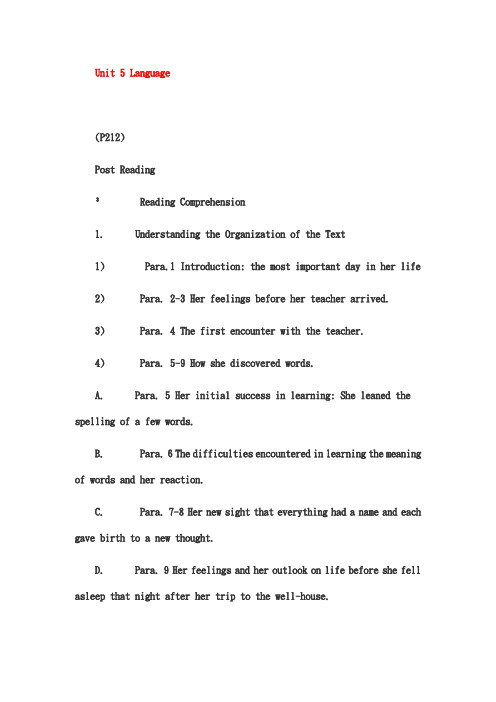
Unit 5 Language(P212)Post Reading³ Reading Comprehension1. Understanding the Organization of the Text1) Para.1 Introduction: the most important day in her life2) Para. 2-3 Her feelings before her teacher arrived.3) Para. 4 The first encounter with the teacher.4) Para. 5-9 How she discovered words.A. Para. 5 Her initial success in learning: She leaned the spelling of a few words.B. Para. 6 The difficulties encountered in learning the meaning of words and her reaction.C. Para. 7-8 Her new sight that everything had a name and each gave birth to a new thought.D. Para. 9 Her feelings and her outlook on life before she fell asleep that night after her trip to the well-house.2. Understanding Specific Information(1) I am filled with wonder when I consider the immeasurable contrast between the two lives which it connects. (l 2~3)A. What do thetwo lives refer to?The two lives she led before and after the teacher came.B. What does it refer to?The day when her teacher came to her.C. What is the immeasurable contrast?Before the teacher came, she lived in a still, dark world in which there was no strong sentiment or tenderness. From that day on, she began to learn not only language but also gained a new sight for life.(2) On the afternoon of that eventful day, I stood on the porch, dumb, expectant. (l5)Why did Helen consider March 3, 1887 an eventful day?Because the day marked a turning point in her life. On that day, the teacher came to her to reveal all things to her, including love.(3) …when it seemed as if a tangible white darkness shut you in, and the great ship, tense and anxious, groped her way toward the shore with plummet and sounding-line…(l13~15)A. White and dark are opposite in meaning. Then what does whitedarkness mean?It refers to a feeling of being lost, like a ship at sea almost incapable of finding her way in a white fog without sunshine.B. What does her refer to?The ship.(4) I was like that ship before my education began… (l16)Read para. 2&3. How did Helen feel before her education began?She felt tense and anxious, waiting for something to happen with a beating heart.(5) … and tried to make me understand that “d-o-l-l” applied to both. (l35)What does both refer to?Both the new doll and the big rag doll.(6) Miss Sullivan had tried to impress it upon me that “m-u-g”is mug and that “w-a-t-e-r” is water, but I persisted in confounding the two. (l36~38)What does the two refer to?The words and the real objects.Sample:On the afternoon of the 3rd of March, 1887, before the teacher came, Helen Keller felt dumb and expectant, hoping for something thatVocabulary Practice1.Section A 1) A 2) B 3) A 4) B 5) C 6) B 7) C 8) C 9) A 10) ASection B1) The soldiers ______ the attack after stopping for a little while. renewed2) The rules of safe driving ________ toeveryone. apply3) It’s no use being sorry if you ________ in doingit. persist4) The cold winter was ________ by a stormyspring. succeeded5) I can’t just _________ everything to receive casualvisitors. drop6) The details of the policy have not been ___________yet. revealed7) The sight of the Great Wall filled me with_________. wonder8) It was on Sunday that Davis felt his loneliness most____________. keenly9) He hunted ________ through his pockets for a piece ofpaper. vainly10) Father ________ on me the value of hardwork. impressed2.1) It is known to all that children, unlike adults, apply rules ________. (conscious) unconsciously2) The ________ crowd in the streets waited for the queen to pass. (expect) expectant3) The birthday party and the movie have made this a(n) ________ night. (event) eventful4) China is a market of ____________ potential.(measure) immeasurable5) Children learn by ________.(imitate) imitation/imitating6) Language is something living and __________ changing. (continue) continually7) She treated the poor girl with ____________.(tender) tenderness8) She was getting very ____________ at having to wait so long. (patient) impatientTranslation1. Seeing all the people walking to and fro outside the office, I became more worried.2. He will see who is his true friend in time.3. That scientist’s experiment gave birth to a new drug.4. He had been shut In by illness for much of the winter.5. They would practice speaking English at the first opportunity.6. Everything she valued/treasured might be swept away overnight7. All the students are busy preparing for the finals towards the close of the term.8. They longed for green trees and open spaces..Part Four Writing and Translation(P 239)2. Translation PracticeFrom English into Chinese1) 他钦佩布朗太太,这使我感到很惊奇。
- 1、下载文档前请自行甄别文档内容的完整性,平台不提供额外的编辑、内容补充、找答案等附加服务。
- 2、"仅部分预览"的文档,不可在线预览部分如存在完整性等问题,可反馈申请退款(可完整预览的文档不适用该条件!)。
- 3、如文档侵犯您的权益,请联系客服反馈,我们会尽快为您处理(人工客服工作时间:9:00-18:30)。
2. Understanding Specific Information
1) F 2) F 3) T 4) T 5) T 6) F 7) T 8) F 9) F 10) T
7) self-awareness (realistic knowledge and judgment about oneself)
8) self-assurance/self-confidence (the belief that you are able to deal with people and problems easily)
3) Yes, it is appropriate and normal to be shy in some circumstances: in the presence of teachers, your boss, your parents’ friends or your prospective in-laws; when you are dating someone, especially the first time; when you are with strangers; when you are in a new environment; when you’re facing a large audience.
iv) Don’t be afraid to speak up and give your point of view.
v) Do not make negative comments about yourself.
vi) Accept criticism thoughtfully.
ix) Set aside time to relax, enjoy hobbies, and reevaluate your goals regularly.
x) Practice being in social situations.
4) Conclusion: (Para.16)
salesperson undependable、shrewd、tricky、boastful
teacher knowledge、talkative、patient、energetic、unselfish、tolerant
doctor calm、skillful、sympathetic、careful、unselfish
3. Group Discussion
1) I think the most effective ways of overcoming shyness are the first and seventh ways. Recognizing our personal strengths and weaknesses is useful because if we know ourselves better, we can feel more self-confident. We can be more objective, instead of being blind. The seventh way is to profit from failures and disappointments as learning experiences. If we allow ourselves to get discouraged and sad when we fail, then we will feel more unsure of ourselves. But if we think of a failure as a learning experience, we are adopting a positive attitude. By analyzing objectively why we failed and planning how to set about doing things differently we will be more likely to succeed next time.
5) self-worth (the value you give to your life and achievements)
6) self-concept (one’s conception or general idea of one’s own basic character and nature)
police office brave、calm、alert、careful
account cautious、careful、efficient、truthful
lawyer knowledge、persuasive、talkative、expressive、intelligent
tourist guide energetic、good-tempered、talkative
Vocabulary
1. Self- is a prefix which means “of, to or by oneself or itself.”
Words with the prefix self- that appear in the text: self-conscious, self-concept, self-assurance, self-worth, self-confidence, self-esteem, self-destructive, self-awareness, self-acceptance, self-rejection, self-confident
spokesperson diplomatic、intelligent、eloquent
III. Post-Reading
Reading Comprehension
1. Understanding the Organization of the Text
1) Introduction: (Para.1)
Book 3课后练习参考答案:
Unit 1
Part one
preparation
1.
1)Gentle 2)Dedicated 3)Considerate 4)Adventurous 5)Calm 6)Aggressive
7)Critical 8)Energetic 9)Selfish 10)Ambition 11)Self-confident 12)Easygoing
3) self-esteem (the feeling that you are someone who deserves to be liked, respected, or admired)
4) self-destructive (with thoughts or actions that are counter to one’s own best interests)
7) slim 8) compliments 9) diminish 10) reassurance 11) detrimental 12) isolated
host or hostess of a show quick-minded、humorous、knowledge、expressive、emotional
reporter adventurous、brave、curious、efficient
secretary considerate、careful、efficient、easygoing
2. Part A
1) B 2) I 3) L 4) A 5) H 6) D 7) E 8) N 9) J 10) M
11) C 12) F 13) G 14) K
Part B
1) profound 2) jealousy 3) numerous 4) overweight 5) overcome 6) eventually
1) self-conscious (worried and embarrassed about what you look like or what other people think of you)
2) self-confidence (belief in one’s own ability, power, judgment, etc.; confidence in oneself)
People with high self-esteem usually act with confidence.
People with low self-esteem are likely to be passive and easily influenced by others.
3) Ways of overcoming shyness: (Para.4-15)
Shyness is the cause of much unhappiness for a great many people.
2) Reasons why shyness can have a negative effect: (Para.2&3)
People’s self-concept as a profound effect on all areas of their lives.
i) Recognize your personal strengths and weaknesses.
ii) Set reasonable goals.
iii) Don’t waste time and energy on destructive feelings such as guilt and shame.
